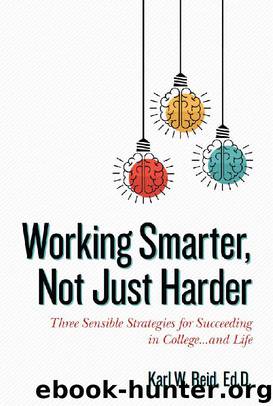Working Smarter, Not Just Harder: Three Sensible Strategies for Succeeding in College...and Life by Karl Reid

Author:Karl Reid [Reid, Karl]
Language: eng
Format: epub
Published: 2017-03-27T04:00:00+00:00
Individual work → Group work (study group)→ Individual work
And it’s vital to give attention to the steps that precede and follow the study group.
Here’s what I mean: For a study group to be effective, everyone in the group must also be prepared to do work on his or her own before and after the group meets. The working group should not be where you get most of your work done; you’ll never master the material that way. As I mentioned earlier, giving yourself focus, reviewing the material on your own, and beginning to work the problems are all essential steps toward deepening your recall, increasing your ability to synthesize the material, and preparing for the study-group discussion. Only by completing these steps are you are prepared, when you finally get together, to contribute to your colleagues’ learning, crystallize your own learning, or correct your understanding of the material.
So those are the steps at the front end. And at the back end? Well, it’s once again time for individual effort.
And here’s what I mean by that: It’s important that you finish the assignment on your own, not with the group. This ensures that you crystallize your understanding; you’re able to take theory and concepts and apply them to the problem at hand. If you don’t lock that in, you run the risk of having the experiences I had early on: good homework grades but poor exam scores because I hadn’t synthesized the material in my own mind.
This approach — individual work at the final stage — also minimizes the chances that you can be accused of plagiarism. Finishing assignments together increases the likelihood of you and your classmates coming up with solutions that look identical, putting you all on the professor’s watch list or, more damagingly, leading to a sanction of some kind.
In short, view the study group as a valuable middle step toward mastery. Think of the entire process as a sandwich. Working individually before and after the study group meets is the bread, and the study group is the meat (or peanut butter and jelly, for those of you who are vegetarians). Now, let’s turn to this question: What makes for a good sandwich?
Download
This site does not store any files on its server. We only index and link to content provided by other sites. Please contact the content providers to delete copyright contents if any and email us, we'll remove relevant links or contents immediately.
| ASVAB | GED |
| GRE | NCLEX |
| PRAXIS | SAT |
| See more | Flash Cards |
| Study Guides | Study Skills |
| Workbooks |
Talking to Strangers by Malcolm Gladwell(13350)
The Compound Effect by Darren Hardy(8949)
Tools of Titans by Timothy Ferriss(8369)
Wonder by R. J. Palacio(8098)
The Lover by Duras Marguerite(7893)
A Court of Wings and Ruin by Sarah J. Maas(7821)
The Circle by Dave Eggers(7105)
Deep Work by Cal Newport(7066)
Kaplan MCAT General Chemistry Review by Kaplan(6928)
To All the Boys I've Loved Before by Jenny Han(5842)
Wiseguy by Nicholas Pileggi(5770)
The Body: A Guide for Occupants by Bill Bryson(5082)
Eat That Frog! by Brian Tracy(4526)
1,001 ASVAB Practice Questions For Dummies by Powers Rod(4501)
Cracking the GRE Premium Edition with 6 Practice Tests, 2015 (Graduate School Test Preparation) by Princeton Review(4284)
Pre-Suasion: A Revolutionary Way to Influence and Persuade by Robert Cialdini(4224)
Barron's AP Biology by Goldberg M.S. Deborah T(4148)
ACT Math For Dummies by Zegarelli Mark(4043)
Alive: The Story of the Andes Survivors by Piers Paul Read(4021)
